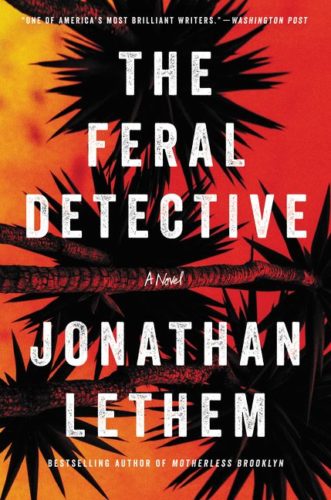Book Review: “The Feral Detective” — Strictly From Hunger
By Vincent Czyz
Farcical fight and sex scenes might be forgivable, but the “mystery” is so barely there it utterly fails to engage — and that’s lethal to a novel in this genre.
The Feral Detective by Jonathan Lethem. Harper Collins, Ecco, 336 pages, $26.99.

The Feral Detective is Jonathan Lethem’s eleventh novel, and though I have not read the other ten, surely I am not wrong touting this as his worst. It’s inept on so many levels it’s hard to do justice to them all in a review of some 1500 words. It’s surprising not only because Lethem won the National Book Critics Circle Award (for Motherless Brooklyn), but also because Motherless Brooklyn was detective fiction. As a fan of the mystery novel, and an even bigger fan of literary mysteries, I was deeply disappointed at every turn: the writing, the characters, what passes for a story, the dialogue, and among other things, the inability of the writer to decide whether he was writing noir or a pastiche.
Although the narrator, Phoebe Siegler, is a Harvard grad who works for the New York Times, she gives up her day job and flies to LA to search for Arabella, the 18-year-old daughter of a friend. The police are unhelpful, but a social worker named Jane Toth hands Phoebe the phone number of Charles Heist, a private detective who specializes in tracking down runaways. The case leads Heist and Phoebe into the Mojave Desert, where they wind up mingling with two bands of civilization’s discontented: the hippie-ish, female-led Rabbits and the biker-ish, toxically masculine Bears. Conveniently enough, Heist has ties to both communities.
Lethem’s first mistake is forcing a private detective and his employer into a partnership. Imagine a client tagging along everywhere Philip Marlowe goes in a Raymond Chandler novel, and you’ll get an idea of the ultra-irritating style-cramping you’re in for. The choice seems to have been made in the service of some Lethemian notion of feminism — Phoebe’s not going to be left behind just because she’s a girl — but it doesn’t work. (Nothing in this novel does.)
Lethem’s idea of a hip female character seems to be one who is preoccupied with “getting laid” and talks crudely about sex. Apparently things that repel us about the stereotypical male look good on a woman. At the same time she’s always prepared, with a can of pepper spray and a klaxon, to be sexually assaulted. The defensive arsenal plays out in ridiculous ways in the opening of the novel, in which Lethem tries hard to make Heist seem ominous and noir-y: his office is a “murky space that grew darker when the voice said, ‘Close the door,’ and I obeyed.” Leaving aside the corny and I obeyed — which suggests Lethem recently reread Bram Stoker — time and again Phoebe reminds us of the pepper spray and klaxon, just in case the private detective decides to rape or murder a client in his place of employment (maybe Jane’s side job is finding Heist’s next score). That doesn’t stop Phoebe from being ready to sleep with him “in some rustic cabin on a fireside pelt rug.” All cabins, of course, come with a musky hide carpet unfurled before a hearth in the interest of facilitating copulation.
You’d think that Phoebe, “a pure product of Manhattan,” would be a little more confident after a few minutes with Heist, especially in light of her attraction to him. Yet on page 10, she’s “terrified,” and on page 15 she confides, “I almost shit my pants.”
It’s painful watching Lethem contort himself to make this work, and it only gets worse. Heist reaches into a drawer (Phoebe expects a gun) and pulls out an opossum named Jean. Next, out of an armoire comes a runaway teen — alas, not Arabella, which could have made for a more interesting and far shorter novel — who then lies down on a bed in the office. What PI stores street girls in an armoire and keeps an iron-frame bed in his office? (The teen’s unexpected appearance is what prompts the loosening of Phoebe’s bowels.) As for the marsupial, she’s dead by page 105. I can’t help but think that her demise might have something to do with a toxic buildup of urine and feces — desk drawers are not known for the efficiency of their plumbing.
When their first intimate encounter arrives — Phoebe and Heist’s, not Heist and Jean’s — it’s torture for the reader. For one thing, the two have zero chemistry. For another, Lethem writes like a straight man whose never met a gay man, but has decided to try his hand at a homoerotic scene. Unappealing as their liaison is, you’d think a little trust would follow. But many pages after they spend the night together, Lethem, apparently unable to drum up another source of narrative tension, still has Phoebe fantasizing about Heist’s dark side: he’s Arabella’s kidnapper (or killer) and she’s next! There are zero indicators that he’s either.
The novel’s dialogue fares no better. In Lethem’s mind, Phoebe is mistress of the snappy riposte. But she comes off as pretentious or gauche — and decidedly unfunny. She’s aware of her lack of wit and constantly apologizes for her inane lines, which often leave Heist (like the reader) confused. Here’s one, referring to the Rabbit and Bear communities, that didn’t make her say sorry: “‘Off-the-gridders,’” I suggested, proud that I could I speaka da lingo.” Off the grid and its variants aren’t “lingo”; they’ve been in common parlance for about 30 years, and her Hollywood-fake accent couldn’t sound any dumber. Nor could her chatter: “Be vewwy vewwy quiet, I told myself. We’we hunting wabbits.” (Yes, this is a book for grownups.) Here’s another beauty: “I put on my Nancy Drew hat.”
Although the whole story takes place in California, a state of some 40 million people, and the pair are never more than a day’s drive from LA, Lethem wants to convince us that this is the edge of the known universe, “the Western void” as he likes to call it. He starts on page 32, when Phoebe meets up with Stephanie, a high school pal who’s moved to Culver City, which is a two-hour drive from LA. According to Google, there’s “a buzzing dining and nightlife scene,” but Stephanie seems to have missed it: “You have to wake up every day and you have to decide who you are in a total void.” Even when driving on a four-lane highway while facing oncoming headlights, many of which belong to “massive eight-wheeled trucks,” Phoebe will insist she and Heist are “off the map,” in some “void,” or that she can no longer even “imagine the sea.” I suppose for Americans who live in the Midwest, the sea, unicorns, and leprechauns all fall under the same heading. Nor will you, as a reader, be in any of the landscapes Lethem skims over like a flat rock over water; his descriptions are cursory and bland.

Author Jonathan Lethem has written a mystery without any clues. Photo: David Shankbone/Wiki Commons
If you thought you were paging through a wordy comic book after several chapters, wait till you get to the showdown between Solitary Love, the reigning king of the Bears, and Heist, whom the Bears consider their “firstborn.” At one point “Heist hatcheted at his opponent’s ribs with his hands clasped into a single fist,” a ludicrous tactic that only works for Captain Kirk. Instead of watching UFC fights, it seems Lethem went with Star Trek reruns to choreograph his bare-knuckle battle. And what’s Solitary Love doing while Heist is trying to chop him down? Lethem doesn’t say, a failure — how the guy on the receiving end reacts — that repeats itself throughout a scene that grows increasingly absurd. By the time it ends, in fact, the single-fisted hatcheting seems like a masterpiece of verisimilitude.
Farcical fight and sex scenes might be forgivable, but the “mystery” is so barely there it utterly fails to engage — and that’s lethal to a novel in this genre. There are no clues to speak of, just a few guesses that — hey, whadda you know? — happen to be right. Lethem doesn’t give the reader much reason to care about Arabella, and it was often a surprise to me when her name surfaced. “Oh, yes,” I thought, “we’re looking for her, aren’t we?”
The writing, if it were any good, might have salvaged the book, but half a dozen sentences per page are overwrought, awkward, dumb, pretentious, or objectionable in some other way. Maybe more. There are a couple of nicely turned phrases, but that’s it. I can think of few literary novels quite so bad at the sentence level. So there’s nothing to recommend about The Feral Detective. If you’re looking for good noir, any Chandler novel is better; so is anything by Martin Cruz Smith. Smith’s best novel, Red Square, was a New York Times Notable Book. He writes far more ably than Lethem and actually knows how to construct a mystery — he’s better than Chandler too. If you gravitate toward the more literary mystery, there’s The Yiddish Policeman’s Union by Michael Chabon, which is everything Lethem’s book is not. Or Motherless Brooklyn; I haven’t read it, but it has to be better than this.
Vince Czyz is the author of The Christos Mosaic, a novel, and Adrift in a Vanishing City, a collection of short fiction. He is the recipient of the Faulkner Prize for Short Fiction and two NJ Arts Council fellowships. The 2011 Capote Fellow, his work has appeared in many publications, including New England Review, Shenandoah, AGNI, The Massachusetts Review, Georgetown Review, Quiddity, Tampa Review, Boston Review, and Louisiana Literature.
